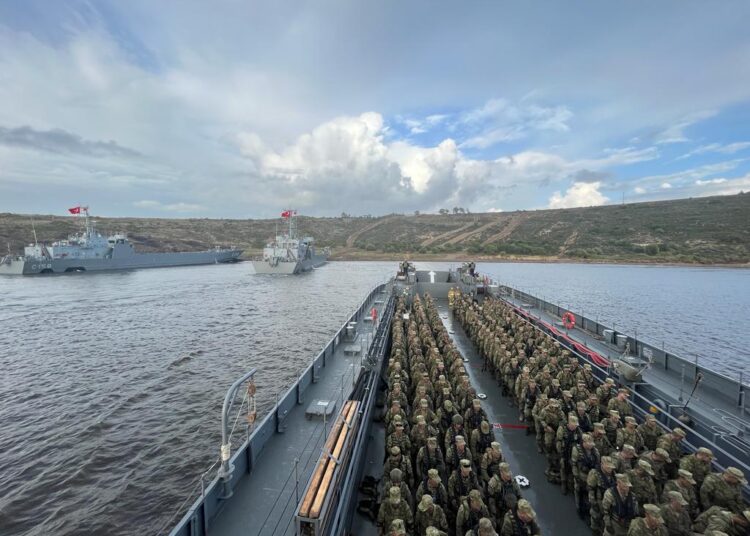Abdullah Bozkurt/Stockholm
The appointment of Gen. Irfan Özsert as commander of Turkey’s Aegean Army — a distinct force established in 1975 primarily to counter Greece and maintained outside of NATO’s integrated military structure — signals potentially troubling developments in Ankara’s already strained relations with Athens.
Özsert has frequently been selected by Turkish President Recep Tayyip Erdogan to execute clandestine operations designed to advance his political objectives, which may not necessarily align with Turkey’s national security interests but serve narrower, more parochial goals. This positions Özsert as a potentially dangerous figure, prepared to deploy Turkish military assets to bolster Erdogan’s regime and increase his political capital, which Erdogan can then use domestically or leverage in negotiations with foreign partners.
In the past this reserved and media-shy general has been tasked with executing clandestine operations abroad, including in Libya and Azerbaijan. He has coordinated covert surveillance operations against NATO troops stationed in Turkey, monitored American officers on assignment in Turkey and played a key role in purging tens of thousands of pro-NATO officers from the military. He has conducted intelligence operations using military assets to support Erdogan’s ruling Justice and Development Party (AKP) government.
Özsert’s new role is undoubtedly pivotal, considering the Aegean Army’s traditional structure and its relative independence from the broader Turkish military command. In wartime scenarios on Turkey’s western front, particularly concerning Greece, the Aegean Army has historically been designated as a principal military force with the authority to assume command over other military units and assets.
One of Turkey’s secret war plans against Greece, code-named “Barbaros” after the Ottoman admiral Hayreddin Barbarossa, envisions a central role for the Aegean Army. This plan outlines the army’s command and control over special forces and air and naval assets to launch attacks on Greek islands in the Aegean Sea and on mainland Greek territory.
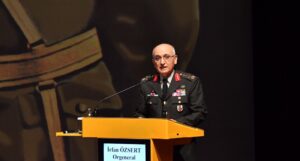
In 2016 President Erdogan promoted Özsert to the rank of major general. Özsert subsequently served as general secretary of the Turkish General Staff from 2016 to 2017. He then took command of military intelligence as head of the General Staff intelligence department, a position he held until 2019.
In this role Özsert and his team of defense and intelligence officials coordinated Turkish military and intelligence operations on Libyan soil. They deployed jihadist fighters from Syria to support pro-Turkey factions, shipped advanced military equipment and provided naval and air assets to cover these operations. Moreover, they sent military officers to command and coordinate attacks. Their identities were exposed when copies of their passports were published by the al-Marsad news outlet in 2019, revealing that Özsert and his aides were actively directing military operations on the ground.
Upon his promotion to the rank of lieutenant general, Özsert was appointed by Erdogan as director general of defense and security (Milli Savunma Bakanlığı Savunma ve Güvenlik Genel Müdürlüğü) at the Defense Ministry in 2019. In 2023 he was elevated to the rank of full general and appointed deputy chief of general staff, the second-highest position in the Turkish military.

His appointment to the Aegean Army this year suggests that the Erdogan government may be planning a new strategy for Turkey’s western borders. It is likely that this involves clandestine operations, potentially targeting Greece, aimed at escalating tensions and consolidating domestic support for the Erdogan administration.
The Aegean Army was also tasked with monitoring the deployment of American troops in Greece, where the US military has gained access to additional Greek bases and plans to expand its presence as part of a broader defense cooperation agreement signed by the two countries in October 2021. While the US claims that its increased military footprint in Greece is aimed at countering Russian influence, the Erdogan government views this expansion as a direct threat to Turkey.
President Erdogan has repeatedly and publicly criticized the increasing US military presence in Greece. During a joint press conference with Venezuelan President Nicolás Maduro on June 8, 2022 in Ankara, Erdogan said, “Right now, nine American bases have been established in Greece. So, who are these bases intended against? Their answer is against Russia. Well, sorry, but nobody buys that.” On November 11, 2021 he further stated, “I can’t even keep track of the number of American bases in Greece. There are so many American bases that, when considered collectively, Greece itself almost appears to be entirely an American base.”
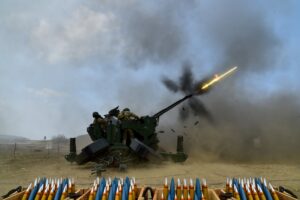
It is evident that under President Erdogan, supported by his far-right nationalist (Milliyetçi) and neo-nationalist (Ulusalcı) allies, Turkey views the US presence in Greece as a significant threat to its interests and is obviously developing strategies to counter this perceived threat. Consequently, the role of the Aegean Army is a crucial element in this threat assessment.
The track record of the Aegean Army offers some insight into potential directions Turkey might take under the new commander. In court testimony on January 16, 2017, veteran police chief Ali Fuat Yılmazer, who previously managed police intelligence and investigated jihadist and neo-nationalist groups in Turkey, revealed how the police uncovered illegal operations orchestrated by the Aegean Army during the tenure of Ahmet Hurşit Tolon, a neo-nationalist general.
According to his testimony, Tolon established a covert intelligence unit within the Aegean Army called the Turkey National Strategies and Operation Department (Türkiye Ulusal Stratejiler ve Harekat Dairesi, TUSHAD). This unit deliberately incited fears of Christians taking over Turkey through missionary work by using propaganda and even creating a fake Protestant church. An intelligence officer was appointed as the pastor, who later claimed to have converted back to Islam and began warning about the perceived dangers of Christian missionary activities in Turkey.
Many American and European Christian organizations were targeted as part of this campaign. Intelligence reports were filed that classified citizens of the US and European Union as significant threats to Turkey’s national security. Turkish government agencies were secretly instructed to obstruct their activities by denying building permits, operating licenses and visa and residency applications.
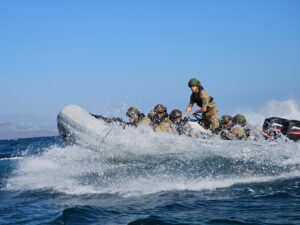
According to Yılmazer, the evidence revealed that it was TUSHAD that orchestrated the brutal murders of three missionaries, including German national Tilmann Ekkehart Geske, at the Zirve Publishing House in Malatya on April 18, 2007. The unit recruited operatives from both the military and civilian sectors to carry out clandestine operations. Their personnel were divided into white, black, and orange units and operated with the highest level of secrecy.
Özsert’s animosity toward the US is well documented. Erdogan selected him to carry out a covert operation to seize control of Incirlik Air Base in southern Adana province during the July 15, 2016 false flag coup attempt. At the time Özsert was on temporary assignment at the base, but he never clarified the nature of this mission during the coup trials. He accused his colleagues, including then-commander of Incirlik Air Base Lt. Gen. Bekir Ercan Van, of being involved in the coup, despite the base having no connection to the events.
The base, home to the US Air Force’s 39th Air Base Wing under a joint agreement between the two countries dating back to December 1954, has frequently been targeted by Islamist, nationalist and neo-nationalist groups. On July 15, 2016 it was placed on terrorism alert, and troops were deployed to counter a potential attack.
Despite the heightened security measures at the base, Özsert kept his distance from the rapid deployment to bolster security for reasons that remain unexplained. Court documents indicate that he disregarded the chain of command and failed to report to his superiors. Instead, he communicated with an unidentified person in Ankara and seemingly received alternative instructions, while his colleagues, observing the established chain of command, reported to their designated positions.
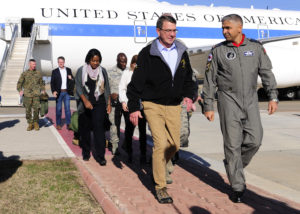
The alleged involvement of Incirlik Air Base, which hosts troops and military assets from the US and other NATO allies, in the military mobilization on July 15 was a key element of the government’s narrative in the false flag coup. Turkish officials publicly accused NATO allies, particularly the US, of orchestrating the coup attempt. To date, the government has not presented any evidence to substantiate these accusations of US and other NATO allies’ involvement in the attempted coup in 2016.
Despite assuming interim command of the base, Özsert assisted the local prosecutor in investigating US, Danish and other NATO allied troops stationed there, which appeared to be a part of a malicious prosecution aimed at reinforcing the government’s false narrative about the coup. Several NATO forces and assets were deployed at the base as part of the US-led Operation Inherent Resolve (OIR), targeting the Islamic State in Iraq and Syria (ISIS), which controlled parts of Syria and Iraq at the time.
Özsert publicly disclosed details about US and allied personnel and the Vectrus defense contractor as well as information on incoming and outgoing flights and cargo loads. This information, some classified as secret, was shared with the prosecutor and incorporated into the public court case file.
A secret document signed by Gen. Özsert that shows classified information on US and other NATO allies deployed at Turkey’s Incirlik Air Base was made public:
During the coup trials, it was further revealed that Özsert operated a torture site at the General Staff headquarters to extract false confessions and provide fabricated evidence against those accused of plotting the coup. One of the victims at this site was Lt. Kübra Yavuz, a protocol officer at the General Staff. In June 2018 she testified that she had been deprived of food, beaten, tortured and electrocuted while in custody for two days at a shooting range on the General Staff compound. Yavuz reported being forced to give a false statement while blindfolded and handcuffed behind her back.
Lt. Yavuz testified that the torture was conducted under the orders of Gen. Özsert and Gen. Zekai Aksakallı, the then-commander of the Special Forces who played a key role in orchestrating the alleged false flag coup in collaboration with the National Intelligence Organization (MIT). Yavuz said her torturers coerced her into signing a prepared statement while being subjected to severe mistreatment. When she was eventually brought before a court to stand trial in June 2018, two years after the incidents, she retracted the statement that had been extracted under duress.
There are significant reasons for concern regarding Özsert’s appointment to lead the Aegean Army and what President Erdogan, known for his affinity for covert operations to bolster his rule, might be planning with this move. Consequently, it is crucial to closely scrutinize Özsert’s activities and monitor the movements and mobilizations within Aegean Army units for stability in the Aegean and eastern Mediterranean.

